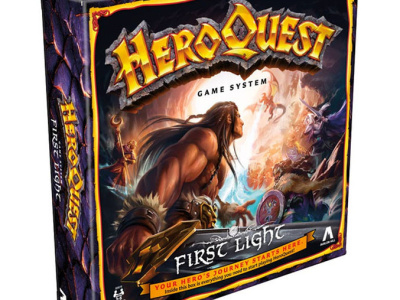
'I Think I Can Manage' is a weekly column by retailer Steven Bates, manager of Bookery Fantasy, a million dollar retail operation in
I'll bet you know your customers pretty well, don't you? Without looking at a want-list or checking a database, you can probably name many of your top clientele and rattle off that key collectible or hard-to-find item they've been jonesing for, or list the key titles on their pull-and-hold file. You might know their favorite game system, which action figure line they like most, even name their favorite character. That kind of attention to detail is what makes you successful at customer service. Knowing what your customers like and want is key to surviving as a retailer (or distributor, publisher, TV executive, game designer, etc.). Though I'm a strong advocate for selling what you personally enjoy (you'll be a more passionate and sincere sales-person if you care about your products, not just the profits they generate), there's a very strong argument that can be made for stocking what your customer wants and is willing to buy. So being in tune with the people shopping your store (or catalog, backlist, channel, yada-yada-yada) makes perfect sense. But what else do you know about them? Are they married? Divorced? Where do they work? Do they like their job? Their boss? Do they have kids? How many? Who did they vote for in the Presidential election, and why? What's their favorite sport? Team? Player? Do they drink? Too much? Or are they teetotalers? Are they religious? A little? Not at all? Who are they, really?
Harvey MacKay, a motivational speaker and author of some great books on business (including Swim With the Sharks Without Being Eaten Alive, Beware the Naked Man Who Offers You His Shirt, and Pushing the Envelope: All the Way to the Top) made his fortune in the envelope business. 'Mr. Make Things Happen' (as he is known) started Mackay Envelope when he was 26, and it's now an $85 million company employing over 500 people. In his books, MacKay describes different ways he built his company, including some brilliant 'guerrilla' tactics and creative-but-practical approaches to advertising and promotion. But what really sticks with me is the 'MacKay 66' (and the similar but abbreviated 'MacKay 33').
The 'MacKay 66' is essentially a comprehensive customer profile, a mini-biography of the client. It covers everything from the obvious-Name, Address, Phone Number-to the obscure-Favorite Places for lunch, Favorite Menu Items. There are even spaces to record the emotional and psychological idiosyncracies of the person being profiled. Of course, gathering this kind of information can take months; MacKay does not suggest you interrogate your customer and document these details openly. He does recommend writing down impressions and information as you uncover them, in the course of casual conversation and from observation. Later, you can record that data in a more permanent fashion, a dossier or database of your own design. You can download a copy of the 'MacKay 66' by clicking here (or visit www.MacKay.com). A shorter version, the 'MacKay 33' is designed with managers in mind, tracking pertinent information of their subordinates.
If all this sounds a bit too J. Edgar Hoover for you, don't worry. Information itself is not an evil thing; how you use it is up to you. In all likelihood, you already have a partial 'MacKay 66' on many of your best customers, stored in your subconscious. We do it all the time, mentally noting things, both good and bad, about our friends, family, associates, and clientele. After reading Mackay's books, I started thinking about the concept of the 66 questions, and whether I could answer them for my top customers. I was pleasantly surprised to find that, for the most part, I could; it helps when you actually like most of the people you do business with on a regular basis. I knew the names of wives, like Lisa, Ruth, and Mo; kids, such as Matt, Tymber, and Contessa; employers, from AAA to
When Michael Freeman, my DC Comics rep, calls on me Tuesdays, we often discuss martial arts before getting down to the business of bumping orders and restocking trade paperbacks. We compare notes on styles, talk about sparring, and even share horror stories about injuries. It's just one aspect of our lives, but it establishes common ground, and that makes me more comfortable talking with Mike (and more receptive to his suggestions, I might add). I don't know if Michael keeps anything like the 'MacKay 66' on his customers per se, but he does pay attention to more than just our account numbers, and treats those on his call list not only with courtesy but personalized attention and respect. Combined with a professional demeanor and vast wealth of knowledge, that makes him a great salesman.
Do I have secret files on all my customers and employees, dossiers filled with bits of data and juicy tidbits from their personal lives? No, of course not. Nor do I recommend you go to such elaborate lengths. But using the concept of and principles behind the'MacKay 66' will make you better at customer service, and that translates into better sales, greater profits, and increased customer retention. In an industry competing with the convenience of the Internet and the discount prices of big box retailers, shouldn't you be offering something more to your customers, too?







